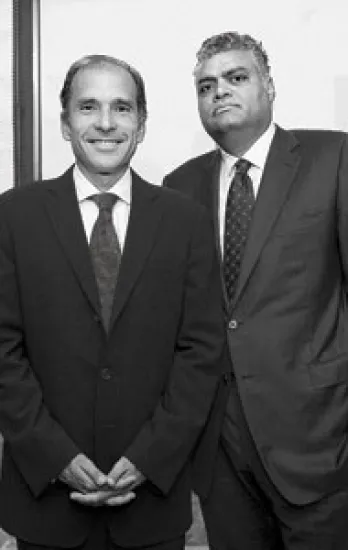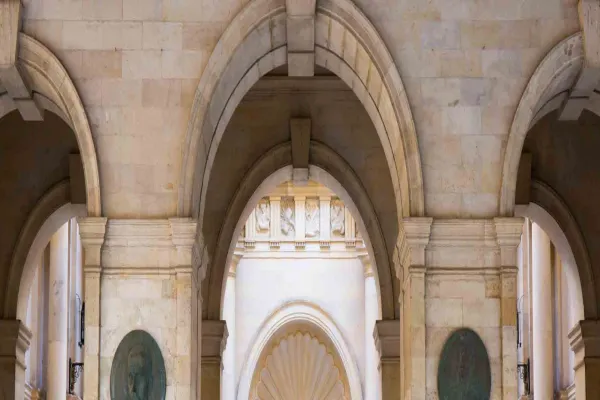A little more than a year into the global credit crisis, the future looks ever more grim from the dealing rooms of Wall Street and the City of London. Mounting credit losses and vanishing liquidity have toppled some of the biggest names in finance, with Lehman Brothers succumbing to a panic, Merrill Lynch & Co. selling itself to Bank of America Corp. and the U.S. government undertaking the biggest financial nationalizations in history by seizing control of mortgage giants Fannie Mae and Freddie Mac and insurer American International Group. The unprecedented turmoil has spread fear and uncertainty throughout much of the world.
But from the glass-and-steel headquarters of EFG-Hermes in the bustling Cairo suburb of Giza, co-CEO Hassan Heikal sees nothing but opportunity. The banker was one of the first to spot the growth potential of the Gulf’s nascent capital markets earlier this decade, opening outposts in such places as Dubai, Kuwait, Saudi Arabia and Lebanon and building EFG-Hermes into the region’s biggest investment bank, with a market capitalization of $2.9 billion and a staff of 880. Now Heikal and co-CEO Yasser El Mallawany are looking to expand that base. In August the bank agreed to pay $126 million for a 45 percent stake in, and management control of, Kuwait’s Gulf Financial Brokerage Co., and it spent £3.2 million ($5.9 million) for 9 percent of U.K. brokerage Panmure Gordon & Co. The two executives are also negotiating to acquire the 71.7 percent that EFG-Hermes doesn’t own in Banque Audi, Lebanon’s second-largest bank, with $18.7 billion in assets. And they are ramping up operations in Saudi Arabia, where the executives believe the potential for growth has been enhanced by a recent government decision to open the country’s stock market to direct investment by foreigners. The goal behind those moves, says Heikal, is to achieve preeminence in a region that is enjoying some of the fastest growth on the planet.
“The rest of the world’s markets are seizing up because of the credit crunch, but we have no worries about subprime losses or shrinking profits and revenues,” Heikal, 42, tells Institutional Investor in a recent interview. “We are riding on a ten- to 15-year tailwind of double-digit growth in this region, and we intend to make the most out of it.”
The best way to do that, adds El Mallawany, is to build a universal bank modeled after Europe’s largest lender. “Our ultimate aim is to be the HSBC of the Middle East and North Africa by acquiring commercial as well as investment banking operations, whether or not the deal with Audi works,” he says.
EFG-Hermes is the leader of a new wave of homegrown investment banks seeking to capitalize on the region’s dynamic growth, which is driving a surge of investment activity. Over the past five years, the annual value of equity issues in the Middle East and North Africa has soared 142-fold, to $26.3 billion — comparing just the first eight months of this year to all of 2003 — while the annual value of M&A transactions has increased fourfold, to $92 billion, and yearly debt issuance has doubled, to $12.3 billion, according to London-based research firm Dealogic. Rivals, including Dubai’s Shuaa Capital and Kuwait’s Global Investment House, are also gearing up their operations.
Global turmoil notwithstanding, major international banks have noticed the opportunity too. Citigroup, Deutsche Bank, HSBC Holdings, Morgan Stanley and UBS, among others, crave growth in the Gulf to offset weakness in their home markets. They have been sending legions of bankers to the area during the past two years and have captured a dominant share of business in merger advising and debt and equity underwriting. This competition poses a serious challenge to the ambitions of EFG-Hermes, bankers and analysts say.
Heikal and El Mallawany “are very aggressive, but I think they could find themselves overstretched in terms of both finances and manpower as they expand on so many fronts,” says the Dubai-based head of Middle East and North African investment banking for a major international bank. “EFG-Hermes got a major head start in this region, but now that we are here and building up staff, they should be focusing their strategy on their most easily defended franchises — brokerage and asset management.”
El Mallawany and Heikal contend that it would be a strategic mistake to narrow the group’s focus or to put more emphasis on money management and brokerage at the expense of other operations. “Eventually, as a universal bank, we expect to be the only regional group able to cross-sell a full range of products to clients, from plain vanilla corporate loans to money management to mergers and acquisitions advice,” says El Mallawany. “In a massively underbanked market, to give up on that goal when we are so close would be to miss out on a strategy that can make us unique. At worst it could ultimately marginalize our businesses.”
In pursuing their goals, El Mallawany and Heikal can count on some potent backing. Dubai Group, an investment vehicle with assets of $40 billion owned by Dubai’s ruler, Sheikh Mohammed bin-Rashid al-Maktoum, is EFG-Hermes’s biggest shareholder; it bought a 25 percent stake from Dubai-based private equity firm Abraaj Capital in November 2007 for $1.1 billion. The Abu Dhabi Investment Authority, believed to be the world’s richest sovereign wealth fund, with assets estimated at as much as
$875 billion, bought 7.5 percent of EFG-Hermes for an estimated $300 million through market purchases in 2007, making it the group’s second-largest shareholder.
“Both Dubai Group and the ADIA are fabulous investors who help us with introductions throughout the region,” says Heikal. “We are able to say that two of the world’s most respected investors back our strategy, and that definitely gives us an edge.”
The ADIA would not comment on its investment in EFG-Hermes, but Soud Ba’alawy, chief executive of Dubai Group, tells II that he fully endorses the firm’s expansion plans. “We will help them in whatever way we can, whether that is with capital or with advice,” he says.
EFG-Hermes is enjoying robust health today. Western investors, stretched by the global liquidity crisis, have been repatriating funds from the region this year, fueling double-digit drops in many stock markets in the Middle East and North Africa, yet EFG-Hermes has continued to achieve strong profit growth. Net profit rose 34.2 percent in the first half from a year earlier, to
757.7 million Egyptian pounds ($138.6 million), while revenue increased 50 percent, to £E1.4 billion. Those results follow a stellar 2007 that saw the bank’s profit soar 82.5 percent, to £E1.3 billion, on a 115 percent increase in revenue, to £E2.6 billion.
Breakneck expansion in brokerage and asset management has been driving the firm’s growth. Brokerage revenue more than doubled, to £E490 million, in the first half of this year. EFG-Hermes has been the leading broker in Egypt since the firm’s founding in 1982. Although it began expanding brokerage operations outside of Egypt only in 2005, the firm is already the No. 1 or No. 2 brokerage house in most of the ten markets in which it operates. The group has rapidly expanded its retail and institutional brokerage presence in Oman, Saudi Arabia and the United Arab Emirates in the past year.
In asset management, where EFG-Hermes has been growing aggressively since 2006, revenue increased more than fourfold in the first half of this year, to £E354 million, as assets under management soared to $8.8 billion from $2.2 billion at the beginning of 2007. Roughly three quarters of those assets are held in regional equities outside of Egypt, compared with just one third at the start of 2007. Of these, about half come from investors in the Middle East and North Africa, and the balance comes from overseas, mostly the U.S. and Europe. Institutional investors provide some 65 percent of total assets, high-net-worth individuals 25 percent and retail customers the remaining 10 percent.
Increased competition is taking a toll on EFG-Hermes’s investment banking business, though. The bank dominates Egypt’s equity capital markets and has a strong mergers and acquisitions practice in its home market — the region’s largest country, with
82 million people — but it is a distinctly second-tier operator when it comes to the rich Gulf region. After promising early days that saw EFG-Hermes take the No. 1 spot in arranging initial public offerings in the UAE for 2006 — it led the record-breaking $659 million IPO of a 22 percent stake in the country’s largest telecom group, Emirates Integrated Telecommunications Co. — the bank hasn’t lead-managed a single deal since.
Capital markets activity took off in the UAE only after the creation of the country’s largest stock market, the Dubai Financial Market, in 2000. Big international banks have expanded their presence there and have quickly seized a clear lead. Through mid-September the top five lead managers of IPOs in the UAE this year are HSBC, Morgan Stanley, UBS, Dubai’s Al Mal Capital and Credit Suisse, according to ABQ Zawya, a Dubai-based financial markets data provider. That marks a dramatic shift from two years ago, when the league table was led by EFG-Hermes, Bahrain’s Gulf International Bank, Dubai Bank, Shuaa Capital and HSBC.
Data on mergers and acquisitions in the Middle East and North Africa is spotty, but in 2007, EFG-Hermes ranked a lowly 19th in the region, having worked on nine deals, worth $3.7 billion, according to Dealogic. All of the top M&A advisers were international banks with headquarters outside of the region, led by Citigroup, which handled 17 deals, worth $41.8 billion. “Companies are naturally turning to investment banks with prestigious brands, global distribution and balance-sheet muscle, leaving local players with pretty slim pickings,” says the Dubai-based international banker. Even in Egypt, where EFG-Hermes still dominates the IPO market — handling two of this year’s three offerings and 61 percent of volume by market value, at $402 million, according to Dealogic — the firm’s M&A franchise is under serious pressure. The bank led the market in 2005 by advising on five deals, valued at $2.1 billion. Last year it handled five deals, worth $2.5 billion, but that was good for only fifth place in a dramatically enlarged market. Morgan Stanley was the top adviser, working on three deals, worth $19.4 billion, including helping France’s Lafarge on its $15 billion purchase of Orascom Cement. The next three biggest advisers were Calyon, the investment banking arm of France’s Crédit Agricole; Citibank; and BNP Paribas. Executives at EFG-Hermes say that the firm’s Egyptian and regional M&A ranking will likely show little change this year.
Slowing deal activity in Egypt and regional encroachment from international competitors contributed to a 31 percent decline in EFG-Hermes’s investment banking revenue in the first half of this year, to £E136 million.
“Unfortunately, we are the division that suffers the most from the regional complex of companies wanting to have a global name on their investment banking deal,” says Karim Awad, the firm’s 32-year-old head of investment banking. “But it is important to keep in mind that we are still building our muscles in a very undeveloped market that is going to change a lot.”
Awad says that EFG-Hermes has a couple of big IPO deals in the pipeline in the UAE that will give a major boost to the firm’s business. He declines to identify the companies, but people who work with the bank say one of them is Al Habtoor Leighton Group, a Dubai-based construction engineering group.
“Local companies are starting to realize that the kind of regional intelligence we have access to — not just through a local investment banking presence but through brokerage, fund management and private equity — is useful to them in investment banking deals,” Awad says. “Achieving a No. 1 or a No. 2 ranking in investment banking regionally will be difficult, but with time we can do it.”
The desire of Heikal and El Mallawany to expand regionally and acquire a commercial bank is a product of the executives’ experience and the history of EFG-Hermes. Heikal’s maternal uncle, pioneering Egyptian investment banker Mohamed Taymour, founded Egyptian Financial Group in 1980. With Taymour as chairman and Heikal’s older brother Ahmed as a senior partner, EFG quickly won advisory mandates from the government and foreign and local companies. When restrictive capital markets rules were reformed in 1992, the firm pushed into brokerage, attracting Western institutional investors as well as wealthy Egyptians with cutting-edge research reports modeled on those of New York and London investment banks. By 1994, EFG was vying for the top spot in Egyptian brokerage with the country’s only other Western-style brokerage operation, Hermes, founded in 1993 by a group of Egyptian bankers who had previously worked in the Cairo office of now defunct U.S. investment bank Kidder, Peabody & Co. Over the next two years, both firms branched into fund management and built up investment banking operations, trading places as the
No. 1– and No. 2–ranked Egyptian investment banks before merging on undisclosed terms in 1996.
The new entity, EFG-Hermes, soon ran into trouble. In 2002, with the Egyptian market in free fall as a result of the global economic downturn that followed the dotcom bubble collapse, the firm tottered on the brink of insolvency because of a series of soured leveraged equity investments that Ahmed Heikal had made in the Egyptian media and Internet industry. A group of Egyptian businessmen, including some members of EFG-Hermes’s senior management, saved the firm by providing a capital infusion of £E200 million, gaining a controlling stake of roughly 25 percent in the process. Ahmed, who was forced out, quickly founded Citadel Capital, Egypt’s largest private equity firm, where he is currently chairman. In his place, EFG-Hermes’s controlling shareholders appointed Hassan Heikal, at the time the head of investment banking, and El Mallawany, then head of private equity, as co-CEOs. In 2006, Taymour left the firm to found Pharos Holding, a small Egyptian investment banking boutique. Taymour was eventually replaced with a nonexecutive chairwoman, Cairo lawyer Mona Zulficar, an old friend of both co-CEOs.
“The idea behind the co-CEO structure has always been to balance Heikal, a hard-charging executive with a big-picture vision for how to advance EFG-Hermes, with the more down-to-earth and well-connected El Mallawany,” says a former board member. “It’s a combination that has, for the most part, worked beautifully.”
A sometimes abrasive man with little patience for details, Heikal is the son of 85-year-old Mohamed Hassanein Heikal, an outspoken journalist and political commentator who was a close aide of former president Gamal Abdel Nasser but was out of favor with his successors, Anwar Sadat and Hosni Mubarak. The elder Heikal frequently criticizes the authoritarian ways of Mubarak, who became president after Sadat’s assassination in 1981.
Heikal insists that his relationship with the Egyptian government is good, but not everyone connected with EFG-Hermes is convinced. “If you want to do anything in Egypt, you need good political connections,” claims the former board member. “In addition to handling the more mundane tasks of group organization, while Heikal spearheads growth initiatives, El Mallawany papers over any fractures with the powers that be stemming from the criticisms of Heikal’s father.”
The easygoing and gregarious El Mallawany, the son of a landowner from the Nile Delta who lost his fortune when he was dispossessed by Nasser in a wave of nationalizations of estates and industry in the early 1960s, is a member of the ruling National Democratic Party. He sits on its influential Policy Committee and helped draft the free-market reforms and cuts in corporate and individual income taxes that have helped Egypt’s economy boom since 2004. He’s also close to the chairman of the NDP’s Policy Committee, Gamal Mubarak, the 45-year-old son of Egypt’s president. The younger Mubarak, widely seen as his father’s likely successor, ran a small investment firm, Medinvest Associates, before becoming actively involved in politics in 2000. He sits on the board of EFG-Hermes’s private equity operation, which with $1 billion under management is one of the largest in the Middle East and North Africa. The former board member and several former employees say that El Mallawany’s connections have helped the firm win business. But El Mallawany insists that, if anything, his connections can be a hindrance. “We avoid bidding on some government investment banking mandates because there could be an appearance of impropriety because of my role in the NDP,” he says.
The memory of the near-collapse of EFG-Hermes back in 2002 is very much on the minds of the bank’s top executives. The effort to diversify revenues through regional expansion and a tie-up with a commercial bank are “entirely the result of our history,” says El Mallawany. “We never want the future of this firm put into question again by overreliance on a particular market or overexposure to a particular line of business.”
The purchase of Kuwait’s Gulf Financial Brokerage gives EFG-Hermes a valuable entrée into a major Gulf market where there are only 14 competitors and the government has frozen the number of brokerage licenses. The stake in Panmure Gordon, meanwhile, opens up a distribution channel enabling the group to provide brokerage and asset management services to European clients.
The real keys to the group’s future growth, though, are its intended acquisition of a commercial bank and the development of its business in Saudi Arabia. EFG-Hermes paid approximately $700 million for a 28.3 percent stake in Lebanon’s Banque Audi two years ago. Heikal and El Mallawany hope to conclude a deal to purchase the remainder this month. The fast-growing Audi is the country’s largest retail bank and operates Lebanon’s biggest brokerage firm. It is also one of the most important private banks in the Middle East and North Africa, with $4.7 billion under management. In the first half of this year, Banque Audi contributed 12.3 percent of EFG-Hermes’s revenue, or £E175 million. The bank has a strong regional franchise, with 75 branches in Lebanon, 40 in Egypt, 17 in Sudan, eight in Jordan and seven in Syria. It also boasts an investment banking subsidiary in Saudi Arabia.
Saudi Arabia is the region’s largest economy and home to the world’s ninth-largest stock market, with a capitalization of
$450 billion. “Both the development of our business in Saudi Arabia and a deal with a commercial bank are essential parts of our long-term strategy to become a one-stop shop for financial services in the region,” affirms Heikal.
Although EFG-Hermes opened for business in Saudi Arabia only recently, in June 2007, the firm has already leveraged its client base in the wider Gulf region to become the Kingdom’s largest foreign broker, with a 2.5 percent market share. A recent liberalization by Saudi authorities offers lucrative potential for further growth.
In August the Capital Markets Authority, Saudi Arabia’s market regulator, agreed to let local brokers like EFG-Hermes swap the economic rights of shares, including any appreciation or depreciation, with investors from outside the six-nation Gulf Cooperation Council while keeping legal ownership of the stock. (The GCC states are Bahrain, Kuwait, Oman, Qatar, Saudi Arabia and the UAE.) Previously, the authorities limited non-GCC residents to investing in a handful of funds. Although it is still early, the move has the potential to vastly expand foreign investment flows into Saudi Arabia — and, as a result, increase EFG-Hermes’s muscle in the kingdom.
“We intend to grow our brokerage practice into the first- or second-biggest operation of its kind in Saudi Arabia and leverage off that to build market-leading money management and investment banking operations there,” says Heikal. The addition of Banque Audi, which is seeking a Saudi retail banking license, could create further possibilities to cross-sell financial services in Saudi Arabia and throughout the Middle East, he adds.
Analysts agree that the prospects are enticing. “As the local investment bank with the best reputation among institutional investors both regionally and internationally, they should see better growth than almost all their rivals, now that Saudi Arabia is open to foreigners,” says Munir Shahin, a Dubai-based banking analyst at Merrill Lynch. “If they play their cards right, their Saudi business could become their largest market in the Gulf and solidify their position as the regional investment banking leader.”
It’s up to Heikal and El Mallawany to deliver on that promise.





